The Tibetan Centre for Human Rights and Democracy (TCHRD) is overcome with grief over the death of the prominent former political prisoner Jigme Gyatso AKA Labrang Jigme at about 12.15 pm local time on 2 July this year.


The Tibetan Centre for Human Rights and Democracy (TCHRD) is overcome with grief over the death of the prominent former political prisoner Jigme Gyatso AKA Labrang Jigme at about 12.15 pm local time on 2 July this year.
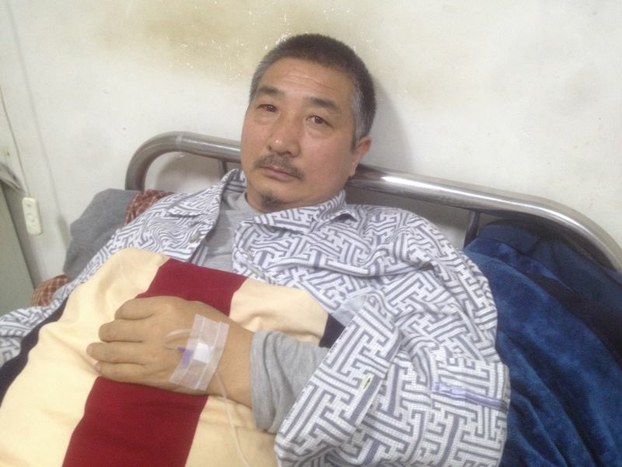
Prominent Tibetan monk Jigme Gyatso who was released from prison after five years last October has been diagnosed with multiple diseases and is now admitted to a hospital in Sangchu (Ch: Xiahe) County of Kanlho (Ch: Gannan) Tibetan Autonomous Prefecture, Gansu Province, in the Tibetan province of Amdo. Jigme Gyatso was admitted to the Sangchu County People’s hospital on 26…
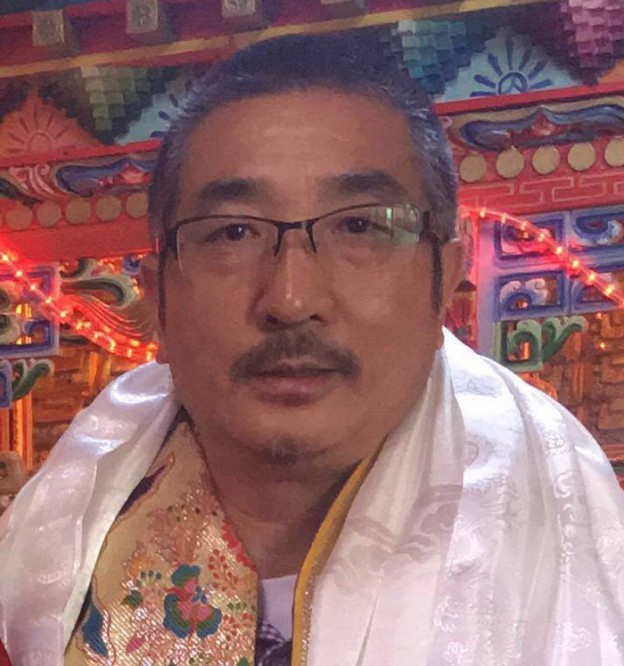

A senior Tibetan monk who spoke on camera about how he was tortured in detention by Chinese police was released this week after serving five years’ imprisonment.
Jigme Gyatso, a former monastic official at Labrang Tashikyil Monastery, was released in the evening after dusk on 26 October from the maximum security Lanzhou Prison located in Chengguan District of Lanzhou City, capital of Gansu Province.
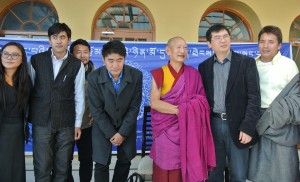
On 15 November 2014, the Tibetan Centre for Human Rights and Democracy (TCHRD) and Tibetan Writers Abroad PEN centre (Tibetan PEN) organized an event to highlight the fate of Tibetan writers imprisoned by Chinese authorities on PEN International’s Day of the Imprisoned Writer.
15 November 2014 is the 33rd anniversary of the PEN International’s Day of the Imprisoned Writer. The 150 PEN Writers Associations throughout the world commemorate the day by organizing events, including seminars, to highlight the fate of imprisoned writers. PEN Writers Associations will officially send letters to the presidents and embassies of these countries, appealing for the immediate release of the imprisoned writers.
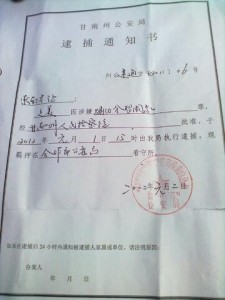
In his first speech as the United Nations’ High Commissioner for Human Rights, Zeid Ra’ad Al Hussein declared “courage is the first human virtue… The courageous individual is he or she who has nothing to wield but common sense, reason and the law, and is prepared to forfeit future, family, friends and even life in defence of others, or to end injustice.”
On the same day that High Commissioner Al Hussein opened the 27th Session of the Human Rights Council in Geneva with these strong words, Radio Free Asia reported that Jigme Gyatso of Labrang Monastery in Gannan (Tib: Kanlho) Tibetan Autonomous Prefecture in Gansu Province had been sentenced to five years in prison for “splittist activities.” This is the first news of Jigme Gyatso since the Tibetan Centre for Human Rights and Democracy (TCHRD) obtained a copy of Jigme Gyatso’s arrest warrant in February 2012. The arrest warrant was issued almost five months after Jigme Gyatso was arrested from his hotel room by 40 police officers.
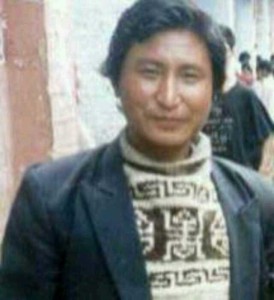
On 3 April 2013, after 17 years Jigme Gyatso was released from prison. He entered prison a strong and healthy 35 year-old and left with weak eyesight, heart complications and kidney damage that kept him from walking upright. Eight years before his release Jigme Gyatso met the UN Special Rapporteur on Torture, who strongly recommended Jigme Gyatso be released because his conviction for “endangering state security” by creating an illegal organization was based on information extracted by torture. During his 17 years imprisonment, he was electrocuted with electric batons and brutally beaten. Today, three months after Jigme Gyatso’s long-awaited release from prison, is the International Day in Support of Torture Victims as Jigme Gyatso struggles with his broken body to live again.
International Day in Support of Torture Victims commemorates the entry into force of the Convention Against Torture, Cruel, Inhuman, and Degrading Treatment (or Convention Against Torture) on 26 June 1987 with the goal of eradicating torture.
No act, except for slavery, has been prohibited as unanimously and repeatedly as torture. The international community recognizes that the prohibition of torture, like genocide and slavery, is a jus cogens norm, a preemptory norm of international law from which no derogation is permitted. The universal rejection of torture forces torturers to deny its existence and hide their victims from the world by placing them in “black sites” and secret detention facilities or denying their existence.
A prominent Tibetan political prisoner, Jigme Gyatso, 52, was released recently after completing his 17 years’ prison term, according to exile Tibetan sources.
After his release, he is said to be in poor health struggling with multiple medical problems including weak eyesight, heart complications, kidney disorder and difficulty walking: all unmistakable signs that he had undergone years of torture, mistreatment and beatings during his imprisonment.
In April 2009, TCHRD issued an urgent statement calling for Jigme Gyatso’s release on medical grounds, after learning that Gyatso was seriously ill.[i] TCHRD’s concerns were based on the long history of Gyatso’s mistreatment and torture in detention centres and prisons in Tibet. Moreover, in February 2009, when relatives met Gyatso at Drapchi Prison Hospital, he appeared very frail and was suffering from a kidney problem. He could only walk with his back bended.

The Tibetan Centre for Human Rights and Democracy (TCHRD) welcomes the news of the release of Jigme of Labrang Monastery on 3 May 2009.
Jigme, a 42-year-old monk was born to a farming family in Lhutang Village, Juicha Township, Sangchu County (Ch: Sangchu Xian) Kanlho “Tibetan Autonomous Prefecture” (‘TAP’) Gansu Province. At the age of 13, he was ordained monk in Labrang Monastery. While in the monastery he mastered Thangka Painting (religious scroll painting), art of making butter sculpture and playing various monastic musical instruments. He once heads the Labrang Monastery’s vocational training centre and was even a vice-chairman of the Democratic Management Committee (DMC) of Labrang Monastery at the time of his arrest.
Jigme Gyatso, a 48-year-old Tibetan political prisoner from Amdo Kersul, who is serving 17 years’ prison sentence is learnt to be seriously ill following years of torture and ill-treatment in the prison since 1996, according to information received by the Tibetan Centre for Human Rights and Democracy (TCHRD) from reliable sources.
The Centre expresses its deepest concern at the continued imprisonment of seriously ill Jigme Gyatso and urges the government of the People’s Republic of China (PRC) to order his immediate release on compassionate health grounds. Jigme Gyatso is currently serving his sentence in Chushul Prison (Ch: Quhui), on the outskirt of Lhasa city.
The Chinese authorities re-arrested Jigme Gyatso, who was previously arrested on 23 March 2008 and then later released on 15 October 2008 for providing assistance to the making of the film LEAVING FEAR BEHIND ( Tib: Jigdrel).
TCHRD learnt from various sources that Jigme Gyatso a.k.a Golog Jigme, age 40, a monk of Amdo Labrang Monastery, was re-arrested by Sangchu County Public Security Bureau (PSB) personnel some where around 10 March 2009 from his residence in Sangchu County, Kanlho (Ch: Gannan) “Tibet Autonomous Prefecture” (“TAP”), Gansu Province.
Sources told TCHRD that around 4 am in the morning, around 10 March 2009, the Sangchu County PSB personnel entered Jigme Gyatso’s room and arrested him without giving any explanation. Since then there has been no information about his whereabouts.

Jigme, a Tibetan Buddhist monk, who provided a rare first-hand account of China’s crackdown on Tibetan protesters to foreign media has been arbitrarily arrested by Sangchu County People’s Armed Police(PAP) and Public Security Bureau (PSB) this afternoon from one of the Tibetan homes in Labrang for unknown reason according to confirmed information received by the Tibetan Centre for Human Rights and Democracy (TCHRD) from reliable sources.